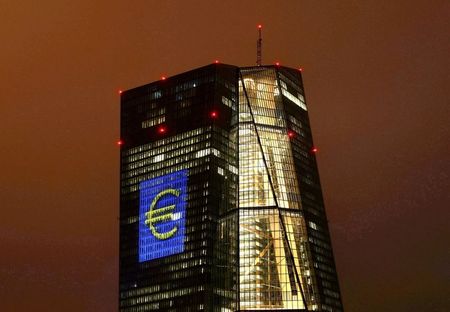By Shrutee Sarkar
BENGALURU (Reuters) – The European Central Bank will be one of the last major central banks to raise interest rates after the COVID-19 pandemic, according a Reuters poll of economists, who still say the risk is a rate rise comes sooner than their current prediction of 2024.
While the ECB has said the recent inflation surge will be transitory and has clearly indicated no policy tightening until it averages around its 2% target, financial markets are pricing in a hike later next year.
“Our baseline forecast is for the ECB to remain on hold through 2024, based on our assessment inflation is indeed transitory, and the expectations the ECB will continue to see it as such,” said Bas van Geffen, senior macro strategist at Rabobank.
“But against the backdrop of higher inflation uncertainty, this does skew risks to an earlier move. That said, we consider current market pricing of a rate hike next year as excessive.”
The Oct. 18-21 Reuters poll consensus pointed to no rate rise through to the end of 2023, but nearly 90% of economists who responded to an additional question, 35 of 40, said the risk was it comes earlier than expected.
Reuters poll graphic on euro zone economy and European Central Bank’s policy outlook: https://fingfx.thomsonreuters.com/gfx/polling/akpezajqlvr/MicrosoftTeams-image%20(45).png
A steady view from ECB watchers but a change in market pricing comes at a time when most other major central banks, including the U.S. Federal Reserve and the Bank of England, are getting much closer to tightening policy. [ECILT/US][ECILT/GB]
The latest ECB poll results appear in line with the central bank’s own view that inflation will be transitory and stay below target over the medium-term.
Poll medians showed the ECB deposit rate unchanged at -0.50% and the refinancing rate at zero through to the end of 2023. A smaller sample looking out more than two years showed the deposit rate at -0.30% and refi rate at zero by end-2024.
Three-quarters of economists who had a view that far in the future, exactly 18 of 24, expect at least one rate hike in 2024.
In September, the ECB took the first step towards unwinding the emergency aid that has propped up the economy during the coronavirus pandemic. It announced a reduction in monthly emergency bond buying this quarter, with the intention to end it completely in March 2022.
Asked about the volume of its regular asset purchases programme (APP) beyond that date, the median of 29 responses showed 40 billion euros worth of bond buys compared with 20 billion euros each month presently. The highest forecast was for 65 billion euros.
That effectively means the ECB will shift some of the existing emergency bond purchases it closes into the regular programme.
Among those who expect asset purchases to increase beyond March, a majority predicted an envelope over a period a time rather than fixed monthly volumes.
When asked about the greater worry for the euro zone economy over the coming year, nearly two-thirds of respondents, or 27 of 42, said it was a bigger than expected slowdown in economic growth. The rest said persistently higher inflation.
The bloc’s economy was expected to grow 1.1% this quarter after expanding 2.0% in Q3, little changed from 1.2% and 2.2% predicted in September. It was expected to average 4.4% next year and slow to 2.1% in 2023, unchanged from last month’s poll. It was predicted to wane to 1.6% in 2024.
Growth and inflation expectations held mostly steady for the euro zone’s three biggest economies, Germany, France and Italy, too.
“Although COVID-19 is now more or less under control, other headwinds are slowing the pace of the euro zone recovery: Supply chain distortions have not disappeared, while surging energy prices will also weigh on growth,” said Peter Vanden Houte, chief economist at ING.
“Inflation continues to surprise to the upside, strengthening the tapering debate within the ECB.”
Euro zone inflation was forecast to average 2.3% this year before slowing to 1.8% in 2022, up from the 2.1% and 1.6% predicted last month.
After rising to 3.4% in September from a year ago, inflation was predicted to increase to 3.5% this quarter. It was then expected to slow next year, dropping to an average 1.4% in Q4 2022.
“An unusually cold winter would put even more upward pressure on gas prices in the short term, but we still think that headline and core inflation will fall sharply next year to well below 2%,” said Jack Allen-Reynolds, senior Europe economist at Capital Economics.
(For other stories from the Reuters global long-term economic outlook polls package)
(Reporting by Shrutee Sarkar; Additional reporting by Sarupya Ganguly; Polling by Tushar Goenka and Vijayalakshmi Srinivasan; Editing by Ross Finley and Hugh Lawson)





